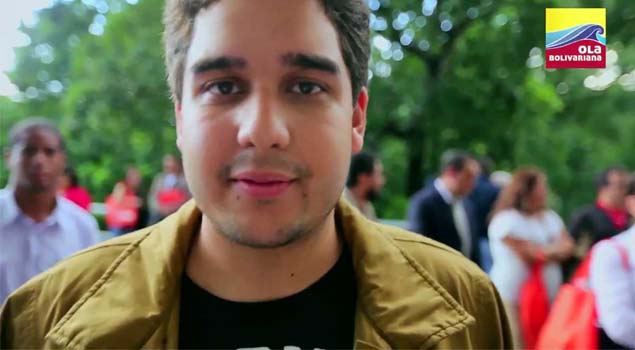CARACAS, (Reuters) – The son of Venezuela’s pro-government human rights ombudsman has stunned the country amid major protests against the leftist administration by publicly calling on his father to “end the injustice.”
The opposition has accused ombudsman Tarek Saab, whose full title is “defender of the people,” of turning a blind eye to human rights abuses and a lurch into dictatorship by Venezuela’s unpopular President Nicolas Maduro.
In many of the vast street protests in Caracas in recent days, marchers aimed to converge on his office, but security forces firing tear gas and water cannons blocked the crowds. Some 29 people have died so far during this month’s unrest.
Venezuelans were shocked to see Saab’s son, a law student, publicly breaking ranks with his powerful father and saying he himself had been a victim of what he called government repression against marchers.
“Dad, in this moment you have the power to end the injustice that has sunk this country,” said Yibram Saab in a video posted on YouTube late on Wednesday, in which he was seen sitting outside and reading from a piece of paper.
“I ask you as your son, and in the name of Venezuela that you represent, that you reflect and do what you must do. I understand, I know this isn’t easy, but it’s right the right thing to do,” added the younger Saab.
His father’s support would be key to allowing lawmakers to open a case to remove the magistrates of the Supreme Court, who in March took over the duties of the opposition-led National Assembly. The decision was quickly overturned amid widespread outrage, but it also sparked sustained protests.

There was no immediate response from the ombudsman, a lawyer and former Socialist Party governor. Saab has also published ten books of poetry, according to his Socialist Party biography, for which he has won numerous prizes.
His office, which describes Saab as a human rights activist whose activities included defending political activists “disappeared” in Venezuela during the last century, did not respond to a request for comment.
In a letter posted later on Twitter, Maduro’s son called on Saab’s son to reconsider his position. The president’s son echoed the government stance that demonstrators are terrorists trying to instigate a coup amid the biggest protests since 2014.
“Your three minutes of fame could have been different. I think you could have picked up the phone and spoken with your father, expressing to him your love and concern and listening to him,” wrote Nicolas Maduro Guerra.
The government has long accused the opposition of attempting to stage a coup against it, citing a short-lived coup attempt in 2002 that briefly deposed late former President Hugo Chavez.
Saab, a staunch Chavez ally, was himself detained for a few hours during that coup, according to rights groups.
OPPOSITION BOOST
Opposition leaders said the video was evidence of growing fissures within “Chavismo,” a movement founded by charismatic Chavez that has taken a hit under Maduro, a former bus driver and union leader whose presidency has been marked by a stark recession and shortages of food and medicine.
In late March, a top Socialist Party official took the rare step of dissenting with the Supreme Court, saying its takeover of the National Assembly “constitutes a rupture of the constitutional order.”
The opposition hoped Saab’s video would further spur protesters to keep up street action despite fatigue, injuries, arrests and no sign of concessions from Maduro.
“We’ve said it before: Venezuela isn’t divided. The majority of us want a change, and that includes the families of those who today prop up this regime,” tweeted opposition lawmaker Juan Andres Mejia amid a flurry of social media chatter about Saab’s son.
Opposition lawmakers, who have a legislative majority but say they have been left toothless by the Supreme Court’s actions, were holding their twice-weekly National Assembly session in Caracas’ lush Miranda Park on Thursday, and invited Venezuelans to attend.
Maduro’s opponents, as well as demanding a general election, are calling for the release of jailed activists, humanitarian aid to help offset shortages of food and medicine, and autonomy for the country’s legislature.
They have been galvanized by the international condemnation of Maduro’s government in the last month and Caracas’ increasing isolation on the global stage.
U.S. President Donald Trump, a strong critic of Maduro, on Thursday said the situation in Venezuela is “very sad.”
Venezuela said on Wednesday it was withdrawing from the Organization of American States and Maduro was set to present Venezuela’s letter of resignation from the body on Thursday, the start of a removal process that could take two years.
His move could have been a pre-emptive one. The head of the OAS had said Venezuela could be expelled from the group, accusing Maduro’s government of eroding the country’s democracy by delaying elections and refusing to respect the opposition-led Congress.




